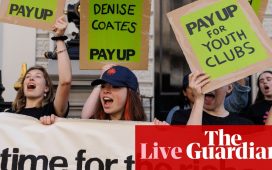Introduction: Bailey says Bank could become ‘a bit more activist’ on interest rates
Good morning, and welcome to our rolling coverage of business, the financial markets and the world economy.
The pound has dropped to a two-week low this morning, after the Bank of England governor told the Guardian that the central bank could become a “bit more aggressive” in cutting interest rates provided the news on inflation continued to be good.
Andrew Bailey told us that he has been encouraged by the fact that cost of living pressures had not been as persistent as the Bank thought they might be.
In an interview with my colleague Larry Elliott, Bailey says that if the news on inflation continued to be good there was a chance of the Bank becoming more “a bit more activist” in its approach to cutting interest rates, now at 5%.
This has knocked the pound, which is down 0.8 of a cent to $1.3185, its lowest level since 19 September (just before the Fed’s rate cut).

The Bank had recently sounded more cautious about rate cuts than its counterparts in the US and the eurozone. It has only made one quarter-point cut this year, in August, while the Federal Reserve has cut US rates by half a point, and the European Central Bank has made two quarter-point cuts since June.
The Bank is next scheduled to set interest rates in early November; the money markets suggest there’s an 88% chance of a cut, to 4.75%.
Bailey made the comments in a wide-ranging inteview, in which he explained he was watching developments in the Middle East “extremely closely”.
Bailey told us:
“Geopolitical concerns are very serious,.
It’s tragic what’s going on. There are obviously stresses and the real issue then is how they might interact with some still quite stretched markets in places.”
Bailey said that in the year since the Hamas attack on Israel there had not been a big rise in oil prices of the sort seen in the past.
He explained:
“From the point of view of monetary policy, it’s a big help we haven’t had to deal with a big increase in the oil price. But obviously we’ve had that experience in the past, and in the 1970s, the oil price was a big part of the story.
“Obviously, we keep watching it. We watch it extremely closely to see the impact of the latest news. But … my sense from all the conversations I have with counterparts in the region, is that there is, for the moment, a strong commitment to keep the market stable.
Here’s the full interview:
The agenda
-
9am BST: Eurozone services PMI index for September
-
9,30am BST: UK services PMI index for September
-
10am BST: Eurozone producer prices index for August
-
12.30pm BST: Challenger survey of US job cuts for September
-
1.30pm BST: US weekly jobless claims report
Key events
This chart from brokerage XM shows major asset price changes this morning – with the pound’s slide against the US dollar at the bottom:
Charalampos Pissouros, senior investment analyst at XM, says
Today, it was the pound’s turn to tumble as BoE Governor Bailey said in an interview with the Guardian that they could turn “a bit more activist” on interest rate cuts if data continues to suggest progress in inflation.
The market is now nearly fully convinced that a quarter point cut will be delivered in November, assigning a 65% probability for another one in December.
Geopolitical risks may have prompted the Bank of England’s governor to hint at faster interest rate cuts, suggests Professor Costas Milas of the University of Liverpool.
Prof Milas tells us:
Andrew Bailey, and rightly so, notes that the Bank’s MPC might cut more aggressively if the news on inflation continue to be good. But this is a given. So, why his comments now? It is not a coincidence that Bailey’s comments coincide with geopolitical risk, fuelled by tensions between Israel and Iran, being on the rise.
As my colleague Mike Ellington and I have noted in an LSE Business Review blog, rising geopolitical risk impacts negatively, and strongly, on four-quarter UK output growth within two to three quarters.
My argument is that Bailey had (also) this negative output scenario in mind when talking about further interest rate cuts.
Pound drops to three-week low
The pound continues to slide against the US dollar – it’s now down a cent and a half, at $1.3115, which is a three-week low.
Michael Brown, senior research strategist at brokerage Pepperstone, reckons the markets may be overdoing it…
The actual remarks from BoE Gov Bailey are *way* more caveated than the way markets appear to have interpreted them…cable off over 1% on this seems rather over-done… pic.twitter.com/lrv7zAS19C
— Michael Brown (@MrMBrown) October 3, 2024
Data just released by the Bank of England shows that UK businesses have trimmed their inflation expectations.
The Bank’s latest ‘decision makers panel’ survey shows that expectations for CPI inflation a year ahead have dropped by 0.1 percentage point to 2.6%.
Firms also expect inflation to be 2.6% in three years time, which is also a drop of 0.1 percentage points compared with last month’s report.
These expectations are important, as they influence how fast companies will expect to raise their own prices.
Firms are still expecting to make inflation-beating pay rises, too.
The Bank explains:
Expected year-ahead wage growth remained unchanged at 4.1% on a three-month moving-average basis in September. Annual wage growth was 5.7% in the three months to September, 0.1 percentage points lower than in the three months to August.
Firms therefore expect their wage growth to decline by 1.6 percentage points over the next 12 months based on three-month averages.
The DMP report also shows a small drop in business uncertainty (despite other surveys showing that confidence has been hit by worries about this month’s budget).
It say:
Uncertainty fell in the three months to September with 48% of firms reporting that the overall level of uncertainty facing their businesses was high or very high, one percentage point lower than in the three months to August
Here’s a chart showing how the pound swooned as the Guardian published our interview with Andrew Bailey online:
UK homebuilders rise after BoE governor hints at faster rate cuts
Andew Bailey’s hint that the Bank of England could be “more aggressive” in cutting interest rates is also moving the London stock market.
Shares in housebuilders are rallying, as traders calculate that lower borrowing costs could lift demand for homes.
Housebuilder Persimmon is the top riser on the FTSE 100 share index, up 3.1%, followed by rival Vistry (+2.3%) and Barratt (+2.2%).
A UK interest rate cut in November now looks almost certain, the City believes.
According to the latest money market pricing, a cut in Bank Rate next month to 4.75% is now a 96.5% chance, leaving only a 3.5% likelihood that the BoE leaves rates on hold at 5% again.
Before Andrew Bailey’s Guardian interview moved the markets, a November cut was around an 88% chance, the markets indicated.
Andrew Bailey’s comments are significant, because a couple of weeks ago he sounded rather more cautious about future interest rate cuts.
On 19 September, when the Bank left rates on hold at 5%, Bailey said “It’s vital that inflation stays low, so we need to be careful not to cut too fast or by too much.”
A week ago, he told the Kent Messenger that he thought the path for interest rates would be “downwards, gradually”.
So, today’s talk about being a bit more “activist” and “aggressive” do feel like a change in stance, which is why the pound dropped this morning.
Breaking News: Sudden fall in #Pound Sterling after Bank of England Governor Andrew Bailey said in an interview with the Guardian newspaper that the central bank could become “a bit more activist” on rate cuts if there was further good news on inflation.
GBPUSD DOWN 0.67%
GBPJPY…— Mohammed_Saif10 (@fx_saif10) October 3, 2024
Today’s fall means the pound has now lost all its gains against the dollar over the last two weeks, since the US Federal Reserve slashed its lending rate by half of a percent.
The Fed’s ‘jumbo’ rate cut weakened the dollar against the pound (and other currencies).
Back in the currency markets, the pound is continuing to drop against the US dollar.
Sterling has now lost a full cent, to $1.3161, as investors digest Andrew Bailey’s suggestion that the Bank could become a “bit more aggressive” in cutting interest rates provided the news on inflation continued to be good.
Inflation was last clocked at 2.2%, in August, only slightly above the Bank’s target of 2%.
Our interview with Andrew Bailey is also moving the government bond market, it seems.
This just flashed up on Reuters:
Gilts are UK government bonds. And prices are rising in early trading, which pushes down the yield (or interest rate) on the debt.
Ths yield on 10-year gilts (a benchmark for govenment borrowing), has fallen by 30 basis points to 4.011%, down from 4.041% last night.
That means the price of the bond has gone up, and indicates that investors are pricing in deeper cuts to UK interest rates in coming months than before.
The pound is also losing ground against the euro, as well as the dollar.
Sterling has dropped by 0.66%, or three-quarters of a eurocent, to €1.1933 against the euro this morning, down from €1.2012 last night.
Bloomberg’s Markets Today liveblog has spotted that Andrew Bailey’s comments are “rippling through bets on Bank of England rate cuts”.
Investors are now more confident that the Bank will cut borrowing costs in coming months.
Bloomberg’s Sam Unsted explains:
Having wavered slightly so far this week, a 25 basis point cut in November is now being fully priced again. And bets are being added further down the horizon too, with 125 basis points now priced by June next year.
The pound slides to its lowest in two weeks versus the dollar following dovish comments by Bank of England Governor Andrew Bailey https://t.co/Wl4GwPVT6d
— Bloomberg UK (@BloombergUK) October 3, 2024
Analyst: Andrew Bailey sinks the pound
Sterling has been rattled by the dovish comments from the Bank of England governor Andrew Bailey in today’s interview with the Guardian, says Kathleen Brooks, research director at XTB.
Brooks points out that the dollar has also been benefitting from ‘safe haven flows’, as nervous investors try to protect their money due to the Middle East crisis.
She says it’s been a ‘bruising week’ for the pound, which may have further to fall against the dollar.
In a note headlined “Andrew Bailey sinks the pound”, Brooks explains:
The pound was already selling off before Bailey’s comments, and GBP/USD is down more than 1% so far this week, it is down from $1.34 at the start of this week to below $1.31 this morning.
It has found decent support at $1.3170, however, this has been a bruising week for the pound, and $1.35 seems like a mountain to climb from here. Part of the pound’s sell off is due to external factors. As geopolitical risks in the Middle East have risen, the US dollar has caught a bid. The currencies that were most extended vs. the US dollar have sold off rapidly, as investors have sought the safety of the dollar.
Hence, the pound and the yen were in the sellers’ sights, as the markets scrambled to buy dollars. The pound is still the best performing currency in the G10 FX space so far this year, thus, if tensions escalate further, then we could see another leg lower for GBP/USD [the pound against the dollar].
Tesco lifts profit forecast

Sarah Butler
Supermarket chain Tesco has announced it now expected to make profit of £2.9bn for the year, up from £2.8bn previously predicted.
Tesco says it will make £100m more than expected after it grabbed share from rivals by cutting prices, put more staff on the shop floor and used AI to target ranges to local tastes.
The UK’s biggest supermarket said it had made £260m of cost savings in the six months to 24 August and had also benefited from restructuring its bank and shoppers trading up to higher priced products as the cost of living crisis has eased.
The retailer said 20 million more people had bought its Finest premium own-label range.
The dollar is also strengthening against other currencies this morning.
Reuters reports:
The dollar scaled a more than six-week high versus the yen on Thursday as robustness in the U.S. jobs market reinforced bets the Federal Reserve will not rush to cut interest rates.
Sterling tumbled to a two-week trough after Bank of England Governor Andrew Bailey said in an interview with the Guardian newspaper that the central bank could become “a bit more activist” on rate cuts if there was further good news on inflation.
The euro slid to a three-week trough after normally hawkish European Central Bank policymaker Isabel Schnabel took a dovish tone on inflation, cementing bets for a rate cut this month.
The yen has come under selling pressure since Japan’s new prime minister said on Wednesday, following a meeting with the central bank governor, that the country is not ready for additional rate hikes.
⚠️ Exclusive: Bailey held out the prospect of the Bank becoming a “bit more aggressive” in cutting interest rates provided the news on inflation continued to be good.$GBP offered on this news pic.twitter.com/tMbnTTzBHg
— PiQ (@PiQSuite) October 3, 2024
Introduction: Bailey says Bank could become ‘a bit more activist’ on interest rates
Good morning, and welcome to our rolling coverage of business, the financial markets and the world economy.
The pound has dropped to a two-week low this morning, after the Bank of England governor told the Guardian that the central bank could become a “bit more aggressive” in cutting interest rates provided the news on inflation continued to be good.
Andrew Bailey told us that he has been encouraged by the fact that cost of living pressures had not been as persistent as the Bank thought they might be.
In an interview with my colleague Larry Elliott, Bailey says that if the news on inflation continued to be good there was a chance of the Bank becoming more “a bit more activist” in its approach to cutting interest rates, now at 5%.
This has knocked the pound, which is down 0.8 of a cent to $1.3185, its lowest level since 19 September (just before the Fed’s rate cut).
The Bank had recently sounded more cautious about rate cuts than its counterparts in the US and the eurozone. It has only made one quarter-point cut this year, in August, while the Federal Reserve has cut US rates by half a point, and the European Central Bank has made two quarter-point cuts since June.
The Bank is next scheduled to set interest rates in early November; the money markets suggest there’s an 88% chance of a cut, to 4.75%.
Bailey made the comments in a wide-ranging inteview, in which he explained he was watching developments in the Middle East “extremely closely”.
Bailey told us:
“Geopolitical concerns are very serious,.
It’s tragic what’s going on. There are obviously stresses and the real issue then is how they might interact with some still quite stretched markets in places.”
Bailey said that in the year since the Hamas attack on Israel there had not been a big rise in oil prices of the sort seen in the past.
He explained:
“From the point of view of monetary policy, it’s a big help we haven’t had to deal with a big increase in the oil price. But obviously we’ve had that experience in the past, and in the 1970s, the oil price was a big part of the story.
“Obviously, we keep watching it. We watch it extremely closely to see the impact of the latest news. But … my sense from all the conversations I have with counterparts in the region, is that there is, for the moment, a strong commitment to keep the market stable.
Here’s the full interview:
The agenda
-
9am BST: Eurozone services PMI index for September
-
9,30am BST: UK services PMI index for September
-
10am BST: Eurozone producer prices index for August
-
12.30pm BST: Challenger survey of US job cuts for September
-
1.30pm BST: US weekly jobless claims report







